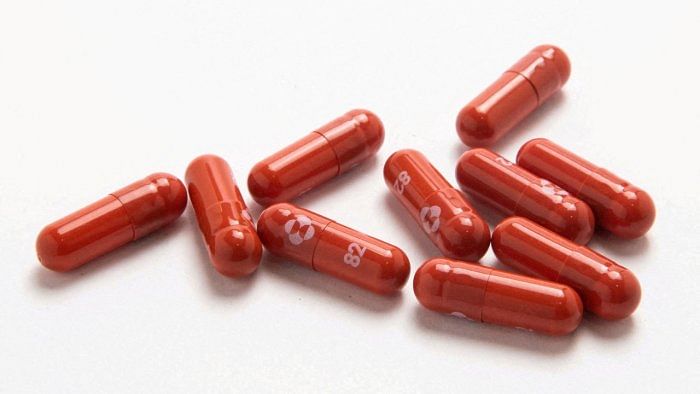
Indian scientists have come out with a new class of broad-spectrum anti-viral drug candidates that not only work remarkably well against disease causing variants of Covid-19 and influenza but also remain effective in tackling the emerging strains.
Moreover, the candidate medicine has the ability to overcome drug resistance that makes some of the current generation antivirals ineffective after some time.
Developed by a team of biologists and chemical scientists, these drug candidates have been found to completely block SARS-CoV-2 variants of concern like the Wuhan, Delta and Omicron strains, besides inhibiting H1N1 and H3N2 strains of influenza to spread inside the cells.
The candidates belong to a class of chemicals known as diphenylurea derivatives or DPUDs. "We have altogether identified five DPUDs that are capable of blocking both SARS-CoV-2 and influenza virus by 95-100 per cent," Indranil Banerjee, one of the lead scientists from Indian Institute of Science, Education and Research, Mohali told DH.
His collaborator Prabal Banerjee at Indian Institute of Technology, Ropar was experimenting with this chemical before the Covid-19 pandemic. Once the pandemic struck, the team also comprising researchers from Indian Institute of Science, Bengaluru and CSIR's Institute of Microbial Technology, Chnadiragh decided to check their antiviral properties.
The scientists prepared 23 DPUDs and found excellent virus-blocking properties in five of them. They block the viral entry -- the first step of the viral life cycle – and stop the pathogens at the cell entrance itself, preventing further progression of infection. Also, despite interfering with the host cell machinery, they don't induce any apparent toxicity in the host, highlighting their potential in clinical applications with minimum or no side effects.
"We have found that DPUDs don't induce any resistance in the virus. We compared the FDA-approved anti-influenza drug Tamiflu with DPUDs to check the induction of resistance in influenza virus. While Tamiflu became ineffective after some time, DPUDs didn't induce any resistance and remained effective even after prolonged exposure to influenza virus," he said.
The scientists claimed that these drug candidates remained effective even after the emergence of a new strain - a property rare to find out among antiviral medicines.
"This is a nice piece of work, which is carefully done and has important implications. However, the results should not be over interpreted to mean that we have a broad spectrum antiviral drug. At this point it's an interesting lead," commented eminent virologist Shahid Jameel, who is not associated with the study.
After demonstrating the efficacy in cultured cells, the team carried out experiments in mice. They infected the animals with the SARS-CoV-2 or influenza virus and subsequently treated them with the DPUDs.
Those received treatment displayed remarkable body weight recovery, improved survival and marked reduction in lung viral load, highlighting their potential as highly-effective, broad-spectrum antivirals.
Half of the untreated Covid-infected mice died, but each one under the DPUD treatment survived, they reported in a recent issue of PloS Pathogen.
The (compounds’) mechanism of action, nicely carved out by the authors, involves disturbances in chloride homeostasis (or balance) inside cells," said Jameel, currently a Research Fellow at Green Templeton College, University of Oxford.
"It is well worth remembering that chloride ions play an important role in controlling the function of neurons in the central nervous system. Its dysregulation leads to seizures and is associated with conditions like schizophrenia, Down's Syndrome, Autism and others. That these symptoms were not observed in mice is encouraging, but mice and humans are different. This requires more study," he added.
The scientists have also applied for a US patent on their discovery.
